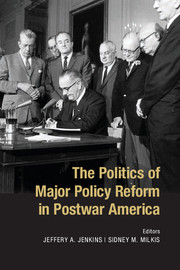Book contents
- Frontmatter
- Contents
- Contributors
- Acknowledgments
- 1 Introduction
- 2 The Long 1950s as a Policy Era
- 3 Regulation, Litigation, and Reform
- 4 Courts and Agencies in the American Civil Rights State
- 5 The Politics of Labor Policy Reform
- 6 Teachers Unions and American Education Reform
- 7 Progressive Federalism and the Contested Implementation of Obama’s Health Reform
- 8 Federalism and the Politics of Immigration Reform
- 9 Trade Politics and Reform
- 10 The Politics of Intelligence Reform
- 11 Follow the Leader
- 12 Conclusion: Madison Upside Down
- Index
- References
9 - Trade Politics and Reform
Published online by Cambridge University Press: 05 November 2014
- Frontmatter
- Contents
- Contributors
- Acknowledgments
- 1 Introduction
- 2 The Long 1950s as a Policy Era
- 3 Regulation, Litigation, and Reform
- 4 Courts and Agencies in the American Civil Rights State
- 5 The Politics of Labor Policy Reform
- 6 Teachers Unions and American Education Reform
- 7 Progressive Federalism and the Contested Implementation of Obama’s Health Reform
- 8 Federalism and the Politics of Immigration Reform
- 9 Trade Politics and Reform
- 10 The Politics of Intelligence Reform
- 11 Follow the Leader
- 12 Conclusion: Madison Upside Down
- Index
- References
Summary
Intrduction
In setting contemporary trade policy, Americans confront issues far afield from that imagined by the nation’s Founders. The frontier in 1789 was sparsely populated, and although the new nation faced a British government willing and able to undermine commercial activity in the colonies, early elected officials worried little about international markets. Instead, they looked west, and America grew in isolated splendor. Isolationism, however, proved to be a short-lived policy. By the end of the nineteenth century, U. S. central decision makers had to deal with growing demands from constituents for access to foreign markets; by the mid-twentieth century, U. S. commercial policy had moved center stage as the United States orchestrated a widespread globalization in production and trade.
Creating that internationally oriented trade policy, however, was problematic. As the introduction to this volume sets out, most U. S. policies are constrained by decisions rendered long ago by America’s Founders; in 1789, those Founders chose to give Congress the right to set tariffs. Instead of imagining tariffs as a foreign policy tool, tariffs were thought to be another tax. As result, high tariff barriers became the norm, used both to increase government coffers and facilitate rapid industrial development. By the end of the Civil War and demise of the southern pro-trade voting bloc, tariff setting had become the quintessential example of unfettered congressional logrolling. When the 1930 Smoot-Hawley tariff was making its way through Congress, more than 1,000 economists signed on to a document decrying its content. But as Schattschneider later wrote in his famous analysis of the act, congressional behavior was as predictable as it was problematic – in the face of powerful interest groups and the authority to set rates high tariffs were inevitable.
- Type
- Chapter
- Information
- The Politics of Major Policy Reform in Postwar America , pp. 203 - 226Publisher: Cambridge University PressPrint publication year: 2014



